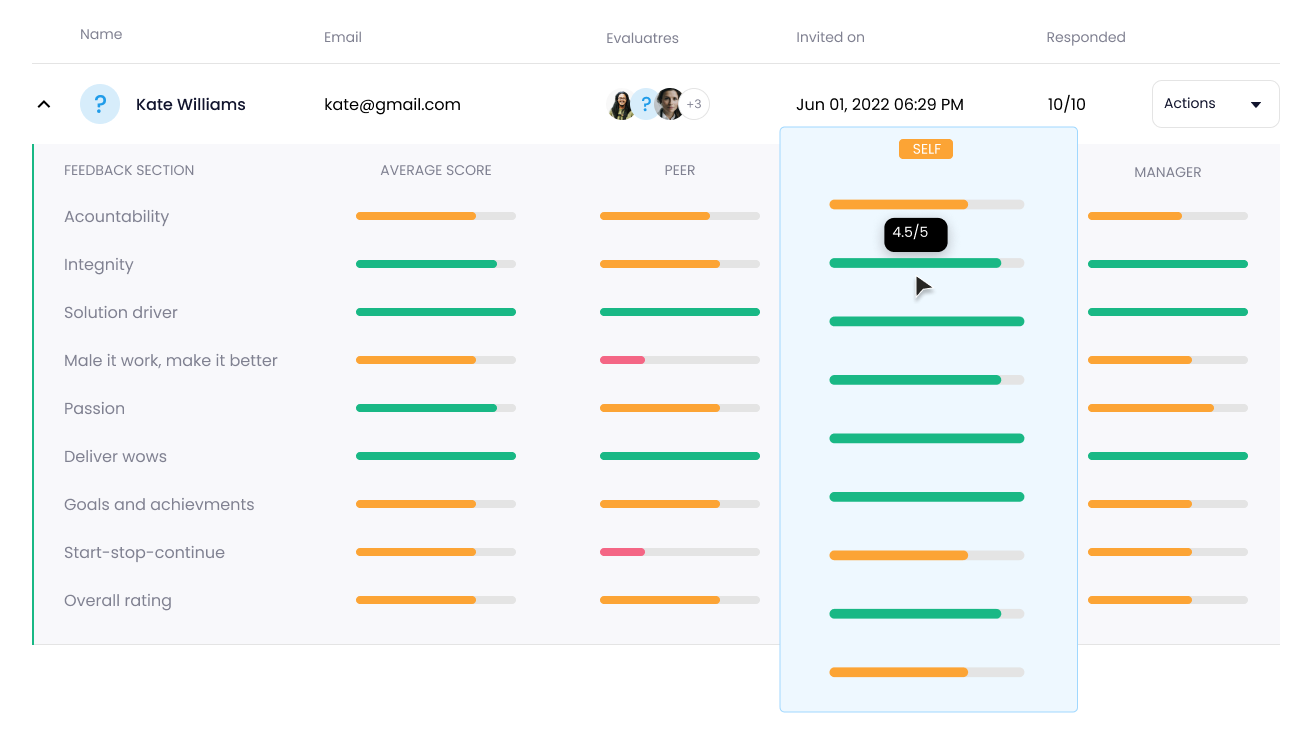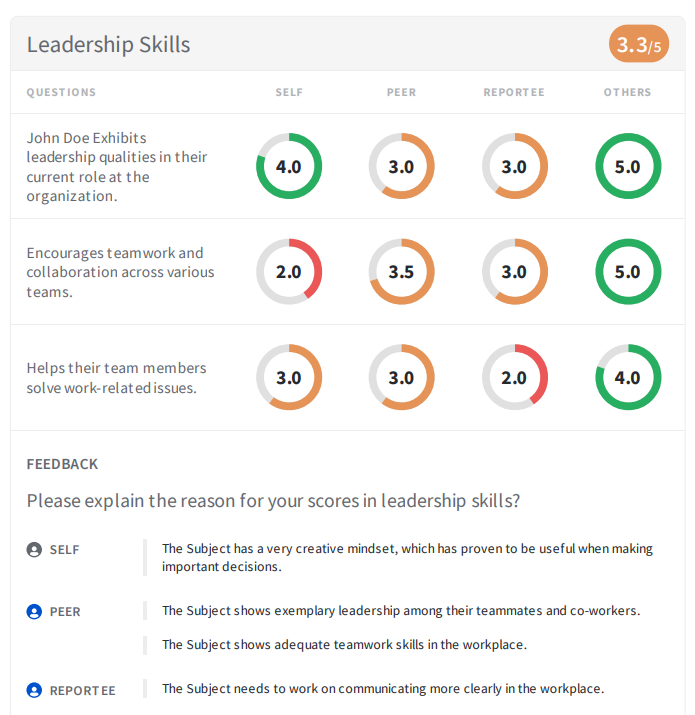Employee Experience
5 Self-Evaluation For Performance Review Examples
Article written by Kate Williams
Product Marketing Manager at SurveySparrow
11 min read
19 September 2025

“Intrinsic motivation is the best form of motivation there is.” So, we’re going to give you five self-evaluation for performance review examples (and much more) to help you write the best performance review you can.
The point is, bonuses, coupons, free food, and all those perks are only temporary if employees aren’t motivated enough to perform. In order to boost this intrinsic motivation, performance reviews and self-evaluations are crucial.
However, an employee’s growth and motivation levels can be profoundly affected by what they write about themselves in self-evaluation and assessment. That’s why it’s important to know what to write (and what not to!) in your self-evaluation comments.
In this article, we will cover:
- 5 self evaluation examples to inspire your own
- The dos and don’ts of self-evaluation
- Why self-evaluation is key to a great performance review
5 Self-Evaluation For Performance Review Examples
Despite the importance, writing a self-evaluation review is anything but easy. Why? Because analyzing oneself is a helluva difficult task – especially when it’s for everyone, from your manager to the decision-makers, to analyze.
That is where these 5 self-evaluation for performance review examples come in. They talk about 5 different self-evaluation scenarios to help you start writing one for yourself. Get sipping on your cuppa, and on we go!
Before we get into the examples, here’s how you can perform Self-evaluation using SurveySparrow…

Create a Free account here to perform self-evaluation!
#1. Self-Evaluation Example: Discussing Company Culture
During the assessment, if you’re at a loss for what to write, discuss how well you fit into the organization’s culture and how you are aligned with the company’s vision. Here’s a self appraisal sample showing just how you can write about that.
This culture, my teammates, and this project have rediscovered my passion and life goals. I feel more aligned with what [company name] wants to achieve in the long run and thoroughly enjoy working with colleagues who support my ideas, however crude they might be!
Long story short, I feel comfortable expressing myself in the best possible manner, and I feel the sky is the limit for all of us here. We keep going.
Thanks,
[your name]
#2. Self-Evaluation Example: Talking About Future Goals
Taking stock of your current performance is always a good way to start self-evaluation, but future goals hold a lot of weight, too. It’s a great way for you to demonstrate your commitment to the company and your team. Give a glimpse of how you plan on accomplishing that with numbers. Here’s a self evaluation template illustrating that.
I took it upon myself to build a personal brand this quarter. Up until now, I’ve managed to attract 15,000 targeted followers in total over my different social profiles. The content I created for it revolved around customer pain points when it comes to [relevant problem] and how best to solve them using tech and innovation.
My goal going forward is to increase engagement with these followers by roughly 25% and subtly start talking about our products/offerings and plans. I also have ideas about collaborating with micro-influencers in our segment which I’d love to discuss, very soon!
Thanks,
[your name]
#3. Self-Evaluation Example: Showing Accomplishment
It is crucial to work efficiently, but it is equally crucial to talk about it. In that respect, one of the most common self-evaluation for performance review examples stems from talking about your accomplishments.
An employee here discusses his recent accomplishments with numbers, preferably in percentages. As a result, managers and bosses have a clear idea of what employees are able to accomplish, and how they will contribute to the bottom line of the organization. Here are some self evaluation phrases you can learn from.
While working in the customer success team this year, I ideated and executed a loyalty program that incentivized customers to make repeat purchases. It has received a great reaction, and the overall retention rate is up by 22% from last year.
I also tested different trial programs to offer our services/products without asking potential customers to commit. This brought down our overall customer acquisition cost by 12%, as people are now trying our offerings, liking them, and then choosing to come on board. And that has all been organically driven, bringing customer acquisition cost down.
Thanks,
[your name]
#4. Self-Evaluation Example: Show You Are a Problem Solver
Every decision-maker wants a team of problem solvers. That’s a no-brainer. Here’s how you can demonstrate your problem-solving skills with this employee self-assessment template.
Thinking fast comes naturally to me, and creative solutions to challenges give me a high! [Team leader name] and my colleagues know I don’t rely on others for my problems. Instead, I give my creative instincts time to think of ways, even creating Plan B’s and C’s, for overcoming difficult situations and scenarios.
In 9 out of 10 situations, it works well in the end, and for that 1 situation, I have fantastic people around me to ask for help and guidance.
Thanks,
[your name]
#5. Self-Evaluation Example: Talking About Your Weaknesses
See, just like your manager wants to see how positive you are about your strengths and qualities, they also want to understand how realistic you are about your weaknesses. Everyone has them, and there’s no shame in acknowledging them. Self-evaluation is the best way to do it. Here’s a self-appraisal sample.
I sometimes struggle to be a team player with a lack of self-discipline and patience. This interferes with my and my team’s ability to perform at our topmost levels.
Getting better at it is my goal for the next quarter/year. And getting more disciplined in my personal life is how I’ll start. Thank you for your continued trust and confidence in me and my potential. I’ll not prove you wrong here.
Thanks,
[your name]
Side note: How do you personally measure your own performance?
Self-evaluation is a core aspect of 360 assessments. 360 assessment software, like SurveySparrow, lets you see your average scores across individual areas in your performance reviews and appraisal reports.

With these numbers, you can check your progress at a glance, and know where you’re lagging behind. Easy, isn’t it?
Not interested in the whole software? In our platform, you’ll also find customizable 360 assessment templates for employees, managers, and interns. Sign up to use them for free.
The Do’s And Don’ts Of Self-Evaluation
You’ve found the words to write a self-evaluation for performance reviews. Going good so far, right?
But there are some do’s and don’ts for writing a self-assessment too. Here they are, starting with the do’s.
Do’s
- Talk about your assigned metrics and KPIs. They would give a clear idea about your work.
- Use numbers to your advantage. Convert these numbers into percentages. It sheds a better light on the difference your work made.
- Keep a diary for your “daily achievements”, however big or small, and use it during self-evaluation. You’ll thank us later!
- Talk about how you’re not perfect and a work in progress who’s constantly learning.
- State all team and personal achievements. It always leaves a positive impression.
- Talk about how you helped better the company values, too – not just achieving company targets.
Don’ts
- Never write your self-assessment hastily. Take your time, collect all thoughts, prepare a draft, edit, synchronize, and only then hit the submit button.
- Don’t make the self-evaluation only about yourself. Talk about your team, manager, and family’s contribution, too.
- Self-evaluation over 3 paragraphs or 250 words is a big no-no.
- Don’t write your achievement in a boastful manner. Write it as a consequence of your positive work.
- Don’t use jargon. Simple words and small sentences work best.
Related: How to Write a Self-Evaluation
What Makes Self-Evaluation Important In Performance Reviews?
A process taking barely 15 minutes to complete has a lasting impact on the employee, the manager, and the organization. And these impacts are different for both the employee and the manager.
For Employees
- Self-evaluation or self-appraisal comments let employees self-reflect on their strengths, weaknesses, and where they missed out on in the past quarter or year.
- By critiquing their work and behavior, workers gain valuable insights, allowing them to grow and be more productive.
- These improvements help in personal life too, not just professionally. So yeah, self-evaluation is damn important for employees.
For Managers
- Employee self-assessments are a way for managers to look into the character and attitude of employees to see what motivates them.
- Managers also understand how employees see themselves in their team and organization.
- Self evaluation phrases also highlight the disagreements or misunderstandings between the manager and an employee.
Related: Employee evaluation: The 8 great dos and don’ts
Go, Ace Your Self-Evaluation!
Yes, that’s what we’re shouting. You now have everything to ace your self-evaluation. Now, just give yourself enough time, read the article again for more clarity, and start evaluating your work.
Organizations that don’t use employee feedback and assessment tools do that for two reasons. Either they aren’t aware of such a tool, or it’s too pricey for them.
Enters SurveySparrow. Its employee 360-degree assessment tool automates the entire employee feedback process, from surveying employees, and analyzing results to finding their satisfaction and performance levels. Self-evaluation is an integral part of it.
So c’mon, don’t let us go on and on. Drop our team a message and we’ll get in touch!

Get upto 40% more responses on your employee surveys. Start your free trial today!
Kate Williams
Excels in empowering visionary companies through storytelling and strategic go-to-market planning. With extensive experience in product marketing and customer experience management, she is an accomplished author, podcast host, and mentor, sharing her expertise across diverse platforms and audiences.
Related Articles

Employee Experience
How To Do Employee Mapping In 2024?
17 MINUTES
8 September 2021

Employee Experience
360 Degree Feedback Examples For Managers
13 MINUTES
14 June 2021

Employee Experience
Employee Experience Journey: How to Tweak It for 1.8x Faster Revenue Growth
8 MINUTES
5 December 2020

Employee Experience
How to Implement Multi Rater Feedback in Your Organization
9 MINUTES
19 May 2023
